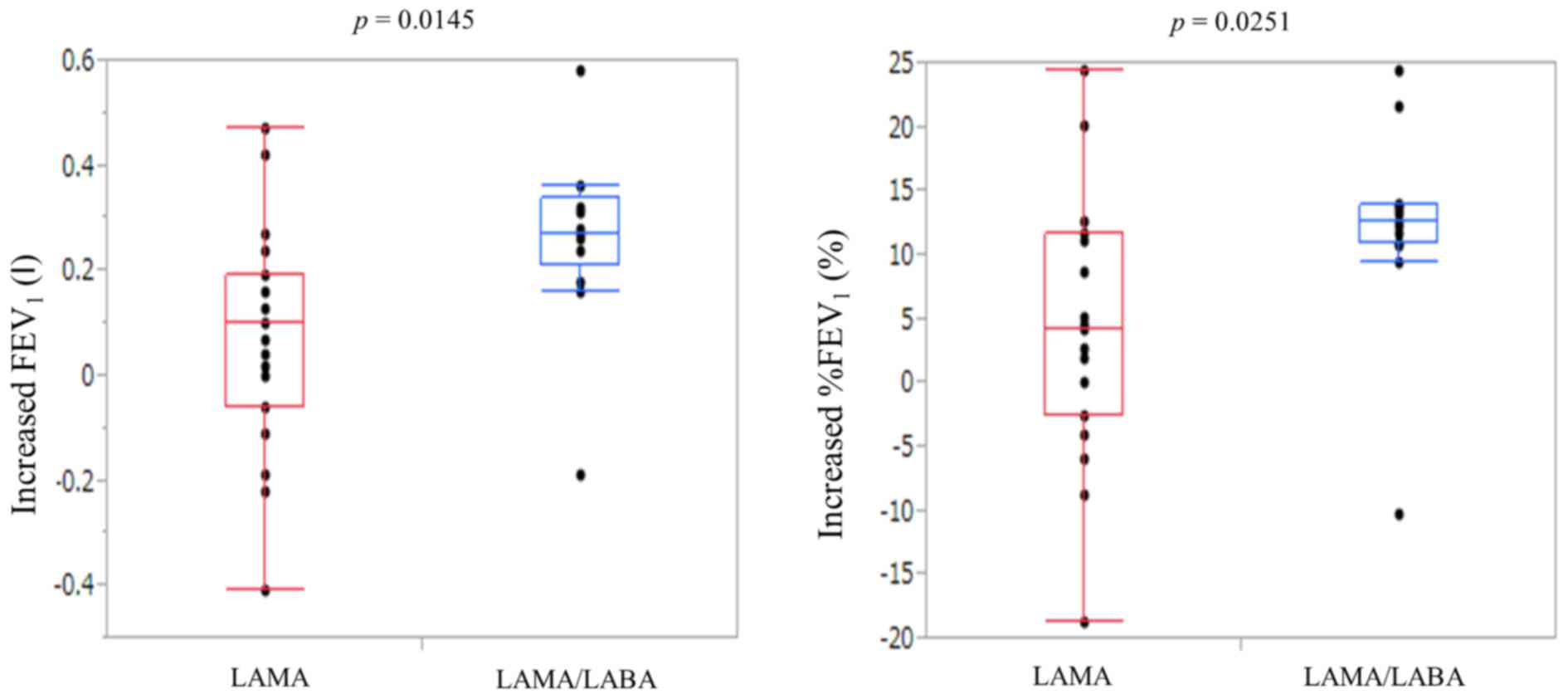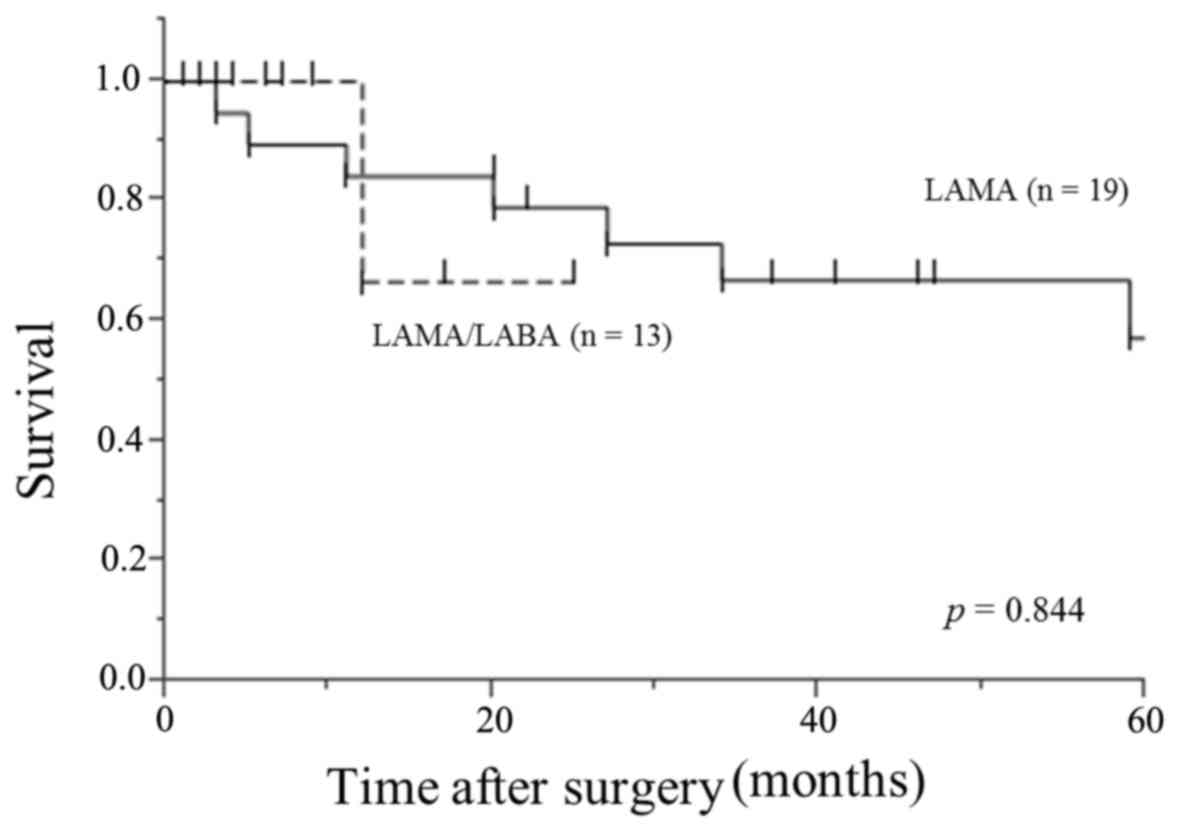|
1
|
Mannino DM and Buist AS: Global burden of
copd: Risk factors, prevalence, and future trends. Lancet.
370:765–773. 2007. View Article : Google Scholar : PubMed/NCBI
|
|
2
|
Anthonisen NR, Connett JE, Enright PL and
Manfreda J: Lung Health Study Research G. Hospitalizations and
mortality in the lung health study. Am J Respir Crit Care Med.
166:333–339. 2002. View Article : Google Scholar : PubMed/NCBI
|
|
3
|
Rabe KF, Hurd S, Anzueto A, Barnes PJ,
Buist SA, Calverley P, Fukuchi Y, Jenkins C, Rodriguez-Roisin R,
van Weel C, et al: Global strategy for the diagnosis, management
and prevention of chronic obstructive pulmonary disease: Gold
executive summary. Am J Respir Crit Care Med. 176:532–555. 2007.
View Article : Google Scholar : PubMed/NCBI
|
|
4
|
de Torres JP, Marín JM, Casanova C, Cote
C, Carrizo S, Cordoba-Lanus E, Baz-Dávila R, Zulueta JJ,
Aguirre-Jaime A, Saetta M, et al: Lung cancer in patients with
chronic obstructive pulmonary disease- incidence and predicting
factors. Am J Respir Crit Care Med. 184:913–919. 2011. View Article : Google Scholar : PubMed/NCBI
|
|
5
|
Win T, Jackson A, Sharples L, Groves AM,
Wells FC, Ritchie AJ and Laroche CM: Relationship between pulmonary
function and lung cancer surgical outcome. Eur Respir J.
25:594–599. 2005. View Article : Google Scholar : PubMed/NCBI
|
|
6
|
Sekine Y, Kesler KA, Behnia M,
Brooks-Brunn J, Sekine E and Brown JW: COPD may increase the
incidence of refractory supraventricular arrhythmias following
pulmonary resection for non-small cell lung cancer. Chest.
120:1783–1790. 2001. View Article : Google Scholar : PubMed/NCBI
|
|
7
|
GOLD: Global Initiative for Chronic
Obstructive Lung Disease (GOLD) 2016 Global strategy for diagnosis,
management and prevention of COPD. http://www.goldcopd.org/
|
|
8
|
Vogelmeier C, Kardos P, Harari S, Gans SJ,
Stenglein S and Thirlwell J: Formoterol mono- and combination
therapy with tiotropium in patients with copd: A 6-month study.
Respir Med. 102:1511–1520. 2008. View Article : Google Scholar : PubMed/NCBI
|
|
9
|
Tashkin DP, Pearle J, Iezzoni D and
Varghese ST: Formoterol and tiotropium compared with tiotropium
alone for treatment of COPD. COPD. 6:17–25. 2009. View Article : Google Scholar : PubMed/NCBI
|
|
10
|
van Noord JA, Aumann JL, Janssens E,
Smeets JJ, Verhaert J, Disse B, Mueller A and Cornelissen PJ:
Comparison of tiotropium once daily, formoterol twice daily and
both combined once daily in patients with COPD. Eur Respir J.
26:214–222. 2005. View Article : Google Scholar : PubMed/NCBI
|
|
11
|
Bateman ED, Ferguson GT, Barnes N,
Gallagher N, Green Y, Henley M and Banerji D: Dual bronchodilation
with QVA149 versus single bronchodilator therapy: The SHINE study.
Eur Respir J. 42:1484–1494. 2013. View Article : Google Scholar : PubMed/NCBI
|
|
12
|
Donohue JF, Maleki-Yazdi MR, Kilbride S,
Mehta R, Kalberg C and Church A: Efficacy and safety of once-daily
umeclidinium/vilanterol 62.5/25 mcg in COPD. Respir Med.
107:1538–1546. 2013. View Article : Google Scholar : PubMed/NCBI
|
|
13
|
Kobayashi S, Suzuki S, Niikawa H, Sugawara
T and Yanai M: Preoperative use of inhaled tiotropium in lung
cancer patients with untreated COPD. Respirology. 14:675–679. 2009.
View Article : Google Scholar : PubMed/NCBI
|
|
14
|
Nojiri T, Inoue M, Yamamoto K, Maeda H,
Takeuchi Y, Nakagiri T, Shintani Y, Minami M, Sawabata N, Okumura
M, et al: Inhaled tiotropium to prevent postoperative
cardiopulmonary complications in patients with newly diagnosed
chronic obstructive pulmonary disease requiring lung cancer
surgery. Surg Today. 44:285–290. 2014. View Article : Google Scholar : PubMed/NCBI
|
|
15
|
Bolukbas S, Eberlein M, Eckhoff J and
Schirren J: Short-term effects of inhalative
tiotropium/formoterol/budenoside versus tiotropium/formoterol in
patients with newly diagnosed chronic obstructive pulmonary disease
requiring surgery for lung cancer: A prospective randomized trial.
Eur J Cardiothorac Surg. 39:995–1000. 2011. View Article : Google Scholar : PubMed/NCBI
|
|
16
|
Lopez-Encuentra A, Astudillo J, Cerezal J,
Gonzalez-Aragoneses F, Novoa N and Sánchez-Palencia A: Bronchogenic
Carcinoma Cooperative Group of the Spanish Society of Pneumology
and Thoracic Surgery (GCCB-S): Prognostic value of chronic
obstructive pulmonary disease in 2994 cases of lung cancer. Eur J
Cardiothorac Surg. 27:8–13. 2005. View Article : Google Scholar : PubMed/NCBI
|
|
17
|
Leo F, Venissac N, Pop D, Solli P, Filosso
P, Minniti A, Radice D, Mouroux J, Spaggiari L, Pastorino U, et al:
Postoperative exacerbation of chronic obstructive pulmonary
disease. Does it exist? Eur J Cardiothorac Surg. 33:424–429. 2008.
View Article : Google Scholar : PubMed/NCBI
|
|
18
|
Nojiri T, Yamamoto K, Maeda H, Takeuchi Y,
Funakoshi Y, Maekura R and Okumura M: Effects of inhaled tiotropium
on left ventricular diastolic function in chronic obstructive
pulmonary disease patients after pulmonary resection. Ann Thorac
Cardiovasc Surg. 18:206–211. 2012. View Article : Google Scholar : PubMed/NCBI
|
|
19
|
Ueda K, Tanaka T, Hayashi M and Hamano K:
Role of inhaled tiotropium on the perioperative outcomes of
patients with lung cancer and chronic obstructive pulmonary
disease. Thorac Cardiovasc Surg. 58:38–42. 2010. View Article : Google Scholar : PubMed/NCBI
|
|
20
|
Halpin D: Nice guidance for COPD. Thorax.
59:181–182. 2004. View Article : Google Scholar : PubMed/NCBI
|
















